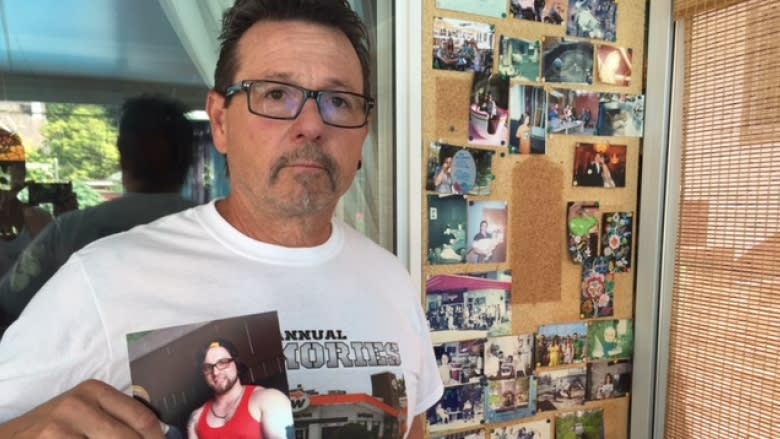Fentanyl deaths of sons bring 2 moms together to work for change
Arlene Last-Kolb and Christine Dobbs sit side by side in a small coffee shop in Riverview, their eyes filled with pain.
Their hearts are broken.
The two Winnipeg mothers have something in common: Their sons both died after overdosing on fentanyl.
"You never get over it and you're never the same," said Last-Kolb.
The two were behind a rally that drew dozens of people to the Manitoba Legislature on Wednesday to mark International Overdose Awareness Day.
Since the deaths of their sons, they've worked to raise awareness about the dangers of fentanyl, a synthetic opioid up to 100 times more toxic than morphine, and the need for treatment for those who are living with addiction.
Last-Kolb's son Jessie died July 18, 2014. He was 24.
Dobbs' son Adam died Feb. 6, 2016. He was 27.
They both went to Riverview Elementary School and Churchill High School.
Last-Kolb didn't know anything about fentanyl when her son passed away, but has spent the last two years reaching out to health officials, police, politicians and other families in hopes of learning everything she can about the drug and what needs to be done to keep others from suffering the same fate as her son.
"If I have a lot of information, it's my duty to share that," said Last-Kolb. "I could help one person, you know.… I think as a parent, I would have wanted that. So you know, all I have to do is help one person."
Since the death of Dobbs' son, she and Last-Kolb have become companions. When Last-Kolb told Dobbs she was planning a rally, Dobbs didn't hesitate to help.
"I said 'OK. I'll hold your hand; I'll stand beside you,'" Dobbs said.
Dobbs said she won't be able to speak at the rally, but she's written letters and made silver ribbons for the event.
She knows the challenges people addicted to drugs and their families face. Adam first started trying to get help in 2010.
"Six years on a roller-coaster ride," said Dobbs. "My son wanted to quit taking drugs."
Fentanyl has been linked to hundreds of deaths in Canada.
For more than a year, it has made headlines in cities across the county and sparked warnings in provinces that have seen its devastating effects.
In January, the Manitoba government launched a Fentanyl Task Force to draw attention to the dangers of the powerful drug and look at ways to combat illicit use.
Members of the task force are conducting an opiate replacement therapy review and developing a surveillance framework. The goal is to gain a better understanding of the context of opiate use in Manitoba and to plan interventions accordingly, a provincial spokesperson said.
Make overdose drug more accessible: message
A pilot program run through Street Connections in the Winnipeg Regional Health Authority supplies users with naloxone, a drug that can reverse the effects of an opioid overdose. From January through August 2016, 102 naloxone kits were distributed and seven were used in opioid overdose reversals, provincial and health authority officials said.
A working group is looking at ways to expand the program in the province.
Making naloxone more accessible will be part of Last-Kolb's message at Wednesday's rally. She wants anyone who shows up at a hospital with an overdose to be trained to use naloxone and be given a kit.
"They should be available to everybody in Manitoba," said Last-Kolb. "I've heard too many stories of people [who] say that if I had a naloxone kit, I could have saved either my child, my boyfriend or my girlfriend."
The two mothers hope that along with remembering those who have lost their fight with drug addiction, the rally will offer support to families dealing with addiction and bring attention to the need to improve care.
"This is my battle," Dobbs said, adding when she's ready she'll become even more involved in advocating on the issue. "The issue we have in Winnipeg, I guess in Manitoba, is there's a serious lack of resources.… It's no one's fault. It's just that we haven't co-ordinated the services. I think that the high numbers of young people, young adults that are faced with addiction is overwhelming for our city and the resources."
They also hope to reduce the stigma and change the way people think about addiction.
"Treat it like we treat any other disease, whether it's cancer, heart disease, diabetes," said Last-Kolb. "These are all diseases that we take care of.… It should be no different for somebody that's in pain from addiction and needing help. They need it right away. They don't need it in two weeks from now."



